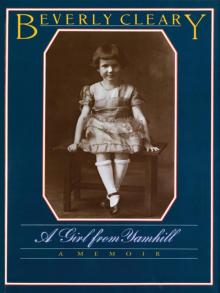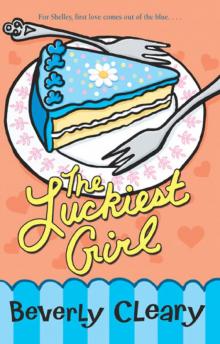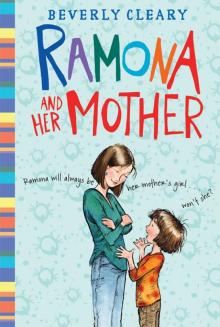- Home
- Beverly Cleary
Sister of the Bride Page 14
Sister of the Bride Read online
Page 14
A ribbon. Barbara did not have a ribbon, but she did have a dress with a belt that tied. She snatched the belt from her closet, ran outdoors, and picked a dozen rhododendron leaves. There was no time to try to sew them to the belt, so she borrowed a stapler from her father and set to work stapling leaves to the belt so that they overlapped. It actually worked. The spines of the leaves were strong enough to hold the staples.
With the wreath, a comb, and a can of hair spray she entered Gordy’s room. The trio stopped singing.
“What’s that for?” Gordy eyed the hair spray suspiciously.
“A genuine Roman hairdo,” Barbara told him.
“Shut your eyes.” Somewhat to her surprise Gordy obeyed without argument.
“You sure smell pretty,” observed Tim, when Barbara had dampened Gordy’s wavy red hair, but neither he nor Al laughed. This occasion was too important to them.
Barbara combed Gordy’s hair down over his forehead. It was so much longer than Constantine’s hair that she separated it into strands, which she twisted into flat curls across his forehead. Then she tied the rhododendron wreath in place and stood back, pleased with what she had done. But that toga. It would not do. It was bunched around Gordy’s neck. “Why are you wearing the sheet that way?” she asked.
“To cover up my T-shirt,” answered Gordy.
Barbara consulted the Latin book once more. The Romans who stabbed Caesar appeared to be wearing collarless, short-sleeved shirts under their togas with one sleeve showing. “Don’t cover it up,” she said. “Here. Do it this way. Throw this end of the sheet over your left shoulder and let your right sleeve show. See? Like the picture.”
“Sure,” agreed Gordy. “But how do I keep it in place? I need my hands to play my guitar.”
“Wait—I’ll get a brooch.” Barbara found a lapel pin among her mother’s costume jewelry and used it to anchor Gordy’s toga securely to his T-shirt.
“What about his feet?” asked Al, who was wearing sandals and leggings. “From the ankles down he looks as if he was about to go swimming.”
What could she do about the zoris? Barbara studied Gordy’s feet until she had an inspiration. In the box of sewing things in the closet she found some odds and ends of seam tape. These she tied to Gordy’s zoris and crisscrossed around his legs like the ribbons on ballet slippers. She looked critically at the results. “It gives the effect of sandals,” she conceded, “and in a costume it’s the effect that counts.”
“Hail to Gordy, noblest Roman of them all,” said Tim, and Barbara could tell that all three boys were pleased with the improvement she had made in Gordy’s costume.
“She came, she saw, she conquered,” said Al.
“Thanks, Barby,” said Gordy. “As Emperor of Rome, I promise not to throw you to the lions.”
Barbara looked directly at her brother. “Is that really a promise?” she asked.
“Sure it’s a promise.” Gordy returned her look. “The Emperor does not go back on his word.”
It was as easy as that, thought Barbara. All I had to do was make the first move toward a truce.
“Hey, Dad!” Gordy called out. “You said you’d drive us to the banquet.”
“Coming,” answered Mr. MacLane from the sun porch.
“Have fun,” said Barbara, and meant it. “Don’t let anybody stab you in the forum.”
Chapter 10
Several things happened that first week in June, all of them inevitable, but several of them surprising to Barbara nevertheless. Rosemary’s final examinations were almost over, to the relief of the whole family. Wedding presents began to arrive, hardly surprising in view of the shopping bag full of invitations that Barbara had shoved, a handful at a time, through a slot at the post office. The University of California announced that it was raising its standards of admissions, bringing a new worry into Barbara’s life. Scholastically she was not quite in the upper ten percent of her class, and she was no longer sure she would be admitted to the university.
But the most surprising event of all was Rosemary’s telephone call announcing that she was going to be a landlady, and wasn’t it marvelous? Now she and Greg did not have to pay rent! They wouldn’t have to give up Greg’s car. They might even save money. A couple they knew—the man had just received his PhD—were moving out of the apartment house they had been managing, and when Greg heard about it, he rushed right over to see the owner before anyone else heard about it. Now they were going to take care of the building, collect the rents for the owner, and get their apartment rent-free. Barbara was not only surprised, she was a little shocked. Rosemary and Greg would, of course, have to have a place to live, but somehow having an apartment to move into made everything seem so final. It was too soon. She did not want time to pass so quickly. As for Rosemary in the role of a landlady—this was too much for Barbara even to try to imagine.
Mrs. MacLane’s reaction to the apartment was different. “A very sensible arrangement,” she said. “And thank goodness they have a place to live. Now we can take the shower presents over to Berkeley and get them out of the way before we are swamped with wedding presents.”
“I’ll drive over with them and bring Rosemary and Millie back,” volunteered Barbara, who had always wanted to take the car out on the freeways. Millie was to stay with the MacLanes until after the wedding.
“It would be a help,” admitted her mother. “I’ll talk it over with your father.”
Mr. MacLane agreed, but this did not make it easy for Barbara to get away with a carload of shower presents when Saturday came. First she had to listen to her mother’s anxious fussing. “Barby, please drive carefully. Remember driving across the bridge is not like driving around Bayview. And cloverleafs can be confusing if you’re not used to them. Cars seem to be coming at you from all directions.”
And her father’s lecture. “Just remember, an accident will increase our insurance rates, and with a wedding in the family we can’t afford one nickel more.” And Barbara had her own worries. If she should have an accident she might smash all her sister’s shower presents, as well as injure the maid of honor. Yes, she would certainly drive with care.
Barbara quickly settled the matter of clothing for the trip. The thing to do on a trip to a university town was to dress as much like a college girl and as little like a high school girl as possible. Even though the day was warm she chose a gray flannel skirt and black blouse Rosemary had left behind. She slipped into her one pair of dark pumps and skipped quickly out of the house before her mother could ask her why she was wearing that warm skirt and her best shoes.
Her parents’ warnings fresh in her mind, Barbara drove with extreme care onto the freeway, around the cloverleaf, and over the bridge. Driving this car is my responsibility, she told herself, her mouth dry and her hands clammy on the steering wheel as she kept pace with the fast traffic. When at last Barbara spun around the cloverleaf that took her off the freeway and into Berkeley, she exhaled in relief, and as she drove along the tree-lined streets she allowed her thoughts to fly off to the subject she had been wanting to think about all morning—Rosemary’s apartment. Lucky Rosemary, about to set up housekeeping, perhaps in one of the new apartment buildings with a mosaic on the front. Lucky Rosemary, with everything new all at once, everything modern, everything shining, everything color coordinated. Pumpkin-colored towels in the bathroom and linen dish towels, printed with designs of herbs, hanging in the kitchen over the stainless-steel sink. All the new pots and pans stored in the cupboards, which would be…let’s see, what were the magazines showing? Birch. Birch cupboards. Lucky, lucky Rosemary.
Or perhaps the apartment would not be new at all. Probably not. A new apartment might be too expensive. Perhaps it was in one of those brown-shingle houses that had been converted into apartments. It would be old and charming. Barbara could see it quite clearly in her mind as she drove along a street bordering the university, the university to which she hoped to be admitted. The entrance to the apartment was in a garden. T
he door was painted peacock blue and was shaded by an old redwood tree. The window ledges were wide, and bright with potted geraniums. Inside, the rooms were paneled in redwood, mellowed to a golden brown. There would be a fireplace, old and quaint, and the furniture would be rattan, with cushions covered in intense colors—greens and blues and violets. The coffee table would be an enormous round brass tray on a stand. The kitchen would be tiny but convenient, built on when the building was converted to apartments. It would have a big window that looked out on a tangle of flowers and shrubs. There would be a fruit tree to blossom in spring….
The blast of a car’s horn snapped Barbara back to reality. She concentrated on her driving every second until she came to Stebbins Hall, which would no longer be Rosemary’s home at the university.
Barbara felt shy as she entered the front door, and was sure that the men leaning over the Dutch door by the switchboard knew at a glance that she was only in high school. The girls in the halls had such an air of belonging that she felt like an intruder. She made her way around a pile of trunks and walked up the stairs and down the hall to Rosemary’s room, where the door stood open. The curtains were down; the blankets were folded on the bare mattresses of the twin beds. It was a box of a room with the two narrow beds, two study tables and chairs, one bookcase, and one dresser. Until Rosemary had decided to get married Barbara had longed to live in a room like this. To share such a room with a roommate instead of a sister, to stay up all night studying if she felt like it had seemed to her a most desirable way to live.
Rosemary was packing books into a carton, and Millie was washing windows. “Oh, hi,” said Rosemary, straightening up. She looked tired. There were circles under her eyes, she had not put her hair up the night before, and she had eaten off most of her lipstick at lunch without taking time to renew it. “My last final was this morning—French. Beginning-language finals always come last, and I was up practically all night cramming,” she said, to explain her appearance.
“Hello, Barbara.” Millie scraped a speck off the window with her thumbnail. “We can’t leave until we wash the windows and the woodwork and scrub the bathroom.” Millie’s long hair was gathered into a careless knot at the nape of her neck, and Barbara hoped that somehow she could be persuaded to take an interest in her appearance before the wedding. Millie said that girls who fussed a lot about clothes and hair only revealed their feelings of insecurity.
“Anything I can do to help?” asked Barbara, looking out the window Millie was polishing at the row of garages with clotheslines on the roof, where a single forlorn slip dangled, forgotten by some girl in her haste to pack.
It took two trips, past different sets of men leaning over the Dutch door by the switchboard, to load Rosemary’s clothes into the car along with the shower presents, and each time Barbara thought uneasily of the higher admission standards. She promised herself she would study much harder during her senior year.
Rosemary and Millie lugged out several cartons and boxes, which, they explained, contained canned goods that were shower presents from the girls in the dormitory. Rosemary laughed when she explained that all the cans had had their labels removed. The last thing that Rosemary brought out, carrying it carefully as if it was precious, was a framed reproduction of a picture that Barbara did not understand at all. It was made up of lines and shapes in black, gray, white, and olive green against a terra-cotta background.
“What is it?” Barbara knew it was unsophisticated to ask.
“Portrait of Moe by Paul Klee.” Rosemary laid the picture carefully on top of her dresses. “A present from the girls in my end of the dormitory. Greg and I think it is terribly good.”
If Rosemary said the picture was good, Barbara would try to believe her, because Rosemary had taken a course in art appreciation and must know what she was talking about.
“You go on and help unload your things,” said Millie to Rosemary. “I’ll finish cleaning our room, and you come back and get me when you’re ready.”
The moment Barbara had been waiting for, the first glimpse of the apartment, was about to arrive. She drove, following Rosemary’s directions, to an apartment house several blocks from the campus. It was a two-story building, old, shabby, and gray, rising from some discouraged shrubbery. It was not at all what Barbara had expected, but she told herself that it would be much nicer inside. Loaded with boxes, the girls climbed the front steps and paused by the row of ten doorbells and names, some typed, some printed, some scribbled. Barbara found a blank space. “Number One. Is this yours?”
“Yes. It didn’t seem right to put Mr. and Mrs. Gregory Aldredge on it until we were married. Anyway, I am not expecting callers.” Rosemary set the picture by Paul Klee down by the door and hunted through her bag for the key. When she found it she inserted it in the lock, turned it, tried the door, found she had turned it the wrong way, and tried again. This time the door opened, and the girls walked along a dark hall past two strollers that apparently belonged to tenants with small children and past a table that held a dim lamp and a pile of the Shopping News. At Number One she struggled with the key once more, and when the door opened she pushed it back and said, “Welcome to our future home.”
Barbara stepped inside, and her first thought was that this was hardly a threshold for carrying a bride across. The light was dim, and the air was warm and close, smelling of disinfectant, stale cigarette smoke, and of the many lives that had been lived here. After Rosemary had raised the window shade she remarked, pointing to some cartons in the center of the floor, “I see Greg’s been here. Those must be his books and records.”
Barbara looked around. The room was small, with a view of the stairwell and the garbage cans of the apartment house next door. The walls were painted the color of dust, and at one end of the room there was a darker rectangle where a former tenant had once hung a picture. The furniture was shabby and of no particular color. There was a large coffee stain on the carpet in front of the lumpy couch. At one end of the room, opposite the dark rectangle, hung a familiar picture of an Indian sitting on a horse. Both the horse and the rider had their heads bowed.
“Did you know the name of that picture is The End of the Trail?” asked Rosemary gaily. “Greg and I think it is terribly funny, and so did our friends who just moved out. They left it hanging for laughs.” Her fatigue seemed to drop away, now that she had left the dormitory. She leaned the Klee against the couch and stepped back to admire it.
Given her cue, Barbara set her carton of shower presents on the chair. She was astonished that Rosemary could be happy about such a dreary place. In the apartment overhead a small child was pounding the floor with a pan. A melancholy saxophone, startlingly close in the apartment house next door, began to play Star Dust. Almost immediately a clarinet in Rosemary’s building took up the melody, garnishing it and elaborating on it. The saxophone switched abruptly to The Old Gray Mare, and the notes of the clarinet pranced along with it.
“Some jam session,” remarked Rosemary. “It goes on every day about this time.”
“Somehow I can’t think of you and Greg as the landlord and landlady type,” Barbara ventured.
Rosemary waved her hand as if it were a wand. “For free rent we will gladly undergo a change of personality. We will probably become a very grim pair, who will pound on the doors at seven o’clock in the morning on the first of the month to demand the rent. Come and see the kitchen.”
That kitchen. Its one window looked out on a blank wall next door. The old black gas stove had a high oven. The sink was small and stained with rust. The linoleum was worn and all the cupboards high. Beneath the window was a rickety drop-leaf table, painted light green. The chipped paint showed a stratum of tan beneath the green. The corners of the table and the backs of the chairs, none of which matched, had been decorated by some past tenants with decals of poodles. Another tenant had tried to scrape them off, but had not succeeded. The ceiling was stained where a sink or bathtub had overflowed in the apartment upstairs.
Depressed, Barbara stepped back into the living room. She did not like to think of all the new dishes in those dingy cupboards. This was a place where people had come and gone, and that, to Barbara, was the only encouraging thing about it. Her sister surely would not live here long. And the apartment must, at some time during the day, get enough light to fade the wall around a picture that had once hung there.
Rosemary was unaware of Barbara’s thoughts and mood. “Come see the bathroom, but don’t let it blind you.” She opened a door off the tiny front hall and snapped on a light.
Barbara was startled. Someone had tried to brighten the room, which had one small window facing on an air shaft, by painting it yellow. It was yellow all right, bright taxicab yellow. Probably the painter had been surprised at how yellow it had turned out to be. There were cracks in the tile floor, and the wall around the edge of the tub was mildewed. Some past tenant had tried to introduce a note of whimsy over the washbasin with decals of goldfish with flirtatious smiles and sweeping eyelashes.

 Ramona Quimby, Age 8
Ramona Quimby, Age 8 Dear Mr. Henshaw
Dear Mr. Henshaw Beezus and Ramona
Beezus and Ramona A Girl from Yamhill
A Girl from Yamhill Ramona Forever
Ramona Forever Jean and Johnny
Jean and Johnny The Luckiest Girl
The Luckiest Girl Emily's Runaway Imagination
Emily's Runaway Imagination Ribsy
Ribsy Ramona the Pest
Ramona the Pest Socks
Socks Ramona's World
Ramona's World Strider
Strider The Mouse and the Motorcycle
The Mouse and the Motorcycle Henry and the Paper Route
Henry and the Paper Route Ramona the Brave
Ramona the Brave Henry Huggins
Henry Huggins Ramona and Her Mother
Ramona and Her Mother Ralph S. Mouse
Ralph S. Mouse Sister of the Bride
Sister of the Bride Henry and the Clubhouse
Henry and the Clubhouse Muggie Maggie
Muggie Maggie Runaway Ralph
Runaway Ralph Ramona and Her Father
Ramona and Her Father Henry and Ribsy
Henry and Ribsy Henry and Beezus
Henry and Beezus Two Times the Fun
Two Times the Fun Fifteen
Fifteen Mitch and Amy
Mitch and Amy